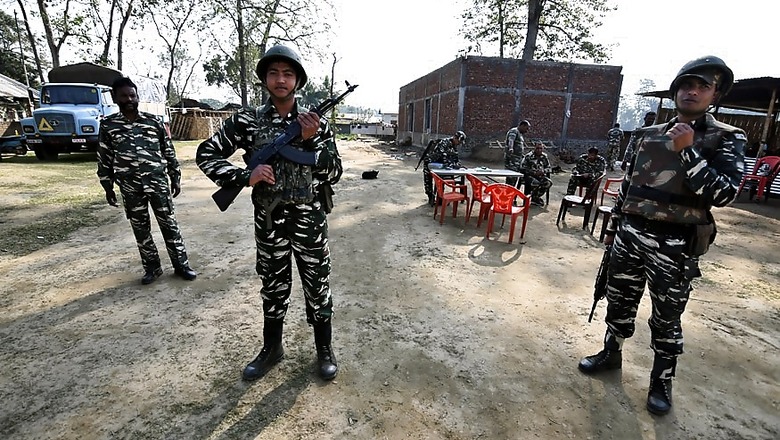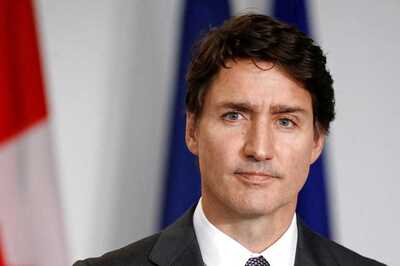
views
Srinagar: Following an order from the central government to move 10,000 additional paramilitary troops to Kashmir, apprehensions on the ground about the removal of the contentious Article 35A have amplified.
One of the major poll planks for the BJP was the scrapping of Articles 35A and 370 in the state. While the much-debated Article 35A gives “special status” to the residents of Jammu and Kashmir and also defines the “permanent residents” of the state, Article 370 limits the Parliament's power to make laws concerning the state.
Kashmiri politicians and activists have started hinting that the Centre is going to repeal Article 35A allowing the Jammu and Kashmir state legislature to define “permanent residents”, conferring them with special rights over property. The constitutional validation of the article has already been challenged in the Supreme Court.
Former J&K chief minister and Peoples Democratic Party (PDP) chief Mehbooba Mufti on Saturday claimed that the “Centre's decision to deploy additional 10,000 troops to the Valley” has created “fear” among residents.
The deployment of the troops, however, is not the only reason that has led to speculation that something is afoot.
A day before the Ministry of Home Affairs (MHA) issued the order of additional deployment, National Security Adviser (NSA) Ajit Doval was on a two-day trip to the Valley.
According to sources, Doval, who is one of the most important persons where New Delhi’s Kashmir policy is concerned, spent the first day at the Nehru Guest house in Srinagar. "The NSA separately met three advisors of Governor Satya Pal Malik; later, the chief secretary and the director general of police also called upon him,” top sources in the administration told News18.
The sources said Doval also met a few civilians whose names were directly sent from the NSA office to the state security. The next day, he went to the Amarnath cave and paid obeisance.
After returning to Delhi, Doval went straight to brief Prime Minister Narendra Modi, said a source.
Other than the poll deployment and Doval’s visit, other developments have taken place in the state suggesting that the state administration is preparing for "something monumental".
When Amit Shah visited Kashmir for the first time after taking over as Union Home Minister, he held a series of meetings with top officials of both the Centre and the state. Shah also met some “influential” civilians, as per sources, and sought their cooperation in the future.
“These new people were not the usual leaders or activists, but people who are loyal to New Delhi and remain covert,” a police official told News18 on condition of anonymity. “We had to even struggle to locate some of them.”
Soon after Shah’s visit, Samant Goel also visited Kashmir for two days within a week after taking over as chief of the Research and Analysis Wing (R&AW). He visited the Line of Control (LoC) and met a number of officials. He also held several meetings with officials and a few civilians.
Apart from these visits, the increase in the magnitude of operations by the National Investigation Agency (NIA) in the state has also intensified speculation.
Despite filing a charge sheet in the “terror funding case” and incarcerating most of the separatist leaders, the central probe agency has called a number of people for interrogation. These include editors of newspapers, businessmen and some mainstream politicians. The NIA has even conducted raids in rural areas of Kashmir, arresting people in different cases.
Mukesh Singh, a Jammu and Kashmir-cadre IPS officer who is an inspector-general in the NIA, has been prematurely repatriated to Kashmir to assist in any future action by government.
Kashmir Inspector General of Police SP Pani, who was transferred to R&AW two months ago, has also not been relieved by the Home Ministry. Sources say the Centre wants Pani —an officer who is a “favourite of the NIA” - to stay on in Kashmir and consider him to be an “effective officer in handling the situations”.
Moreover, one of the most experienced J&K police officers, Additional Director General of Police (Law and Order) Munir Khan, has been given a one-year extension. This move is to ensure the presence of “a Muslim face in the J&K Police”, claim sources.
The appointment of Farooq Khan, a new advisor to Governor Satya Pal Malik, is also being linked to this. Khan was the first officer to head the J&K Police’s counter-insurgency wing, Special Operations Group (SOG), and is also a leader in the BJP’s minority cell.
According to sources, Shah is also meeting a number of Kashmiri “stakeholders in Delhi and, off record, all of them assured him help”.
Another development being related to the current happenings in Kashmir is that despite completing his tenure, Rahul Rasgotra, Joint Director of Kashmir of Intelligence Bureau, was not called back.
Apart from this, some senior BJP leaders, including former Madhya Pradesh Chief Minister Shivraj Singh Chouhan, are currently in Kashmir. They are meeting party workers in the state and asking them to “work for peace”.
The state police, however, termed the additional troop deployment as a usual security exercise. “There is nothing extraordinary in it. It is a usual exercise,” J&K Police DGP Dilbagh Singh told News18. He added these troops are being called in to give rest to the already-deployed paramilitary forces since the urban body polls held in October last year.
“We have large numbers of forces deployed in the Valley, who have been working continuously from the last nine months. We have to give them some rest,” said Singh, urging people to not pay heed to rumours.
The Home Ministry has said these personnel will be deployed to strengthen the counter-insurgency grid and law and order duties in the Kashmir Valley. Officials said the additional troops are being air-lifted and sent by trains.
(With inputs from Aakash Hassan in Srinagar)



















Comments
0 comment